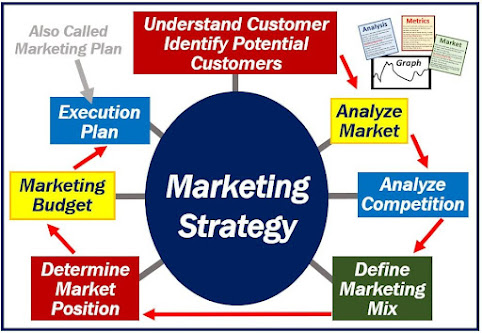
Marketing strategy comes up regularly as a topic at B2B Startups. However, often it is confused with operational effectiveness.
Operational effectiveness Is Not Strategy.
The root of the problem in answering the question of ‘What is marketing strategy?’ is the need for more clarity in distinguishing between operational effectiveness and strategy.
Of course, companies must be flexible to respond rapidly to competitive and market changes. They must benchmark continuously to achieve best practices.
Marketing has more platforms, ways to measure, and analytics benchmarks than ever. Although the resulting operational improvements have often been dramatic, many companies have been frustrated by their inability to translate those gains into sustainable marketing profitability.
Despite improvements in all aspects of marketing technology, hitting the right metrics like cost per click, cost per impression, cost per lead, opportunity, and, of course, return on investment of marketing campaigns (ROMI) continues to be a challenge.
‘A rising tide lifts all boats’
When everyone benefits from these incremental operational improvements – anything from better buyer intent data, to a clearer understanding of which marketing channels, campaigns, and ads drive the best results (Marketing ROI or ROAS), by the same logic, no one benefits.
That is too stark an option since, yes, some companies are in the top 5% of utilizing the latest marketing technology the most effectively and naturally, they will benefit relative to the competition. But the problem is that those methods can be duplicated.
Yet many B2B Startups don’t want to admit that their often bigger, wealthier competitors may have a strong edge—a bigger brand and deeper pockets than them.
In my 20 years in Marketing, in some companies I’ve worked at, no one, even in the marketing department, had a clear idea of the marketing strategy, nor could they articulate it.
Occasionally this topic comes up profoundly. For example, about ten years ago, the CMO of a fast-growing and successful cybersecurity software company I worked for wanted to move away from marketing focused on lead generation, to almost exclusively on branding.
Eventually, the will of the CEO prevailed; the CMO left, and the company shifted back from branding to a heavier investment in lead generation.
For a B2B Startup, what’s more important – Branding or Demand Generation (Activation)? Turns out the CEO was right. According to research, creating new customers early is more important than creating a brand.
Your brand will develop from your customers and your employees. That’s no doubt why that start-up is now a $30 billion market cap listed company on the Nasdaq. Of course, once you have a solid roster of customers, that is the ideal time to focus on the brand.

Operational effectiveness and strategy are both essential to superior performance. However, a company can only outperform its rivals sustainably in the long term if it has a superior marketing strategy.
Operational effectiveness means performing similar activities better than rivals. Another reason that improved operational effectiveness is insufficient—competitive convergence—is more subtle and insidious. The more benchmarking companies do, the more they look alike.
So what exactly is a Marketing Strategy for a Business to Business company?
A business-to-business (B2B) marketing strategy is a comprehensive plan designed to promote and sell products or services from one business to another. This strategy is tailored to the unique dynamics of B2B interactions, where the customer base consists of other businesses, rather than individual consumers.
The first key aspect of a B2B marketing strategy is a deep understanding of the target market.
This involves conducting thorough research to identify the specific industries, companies, and decision-makers most likely to benefit from the products or services offered.
Once the target audience is defined, the strategy creates a value proposition that addresses these businesses’ specific challenges and needs. This might involve showcasing how the product or service improves efficiency, reduces costs, enhances productivity, or provides a competitive advantage.
The second component is communication.
Effective B2B marketing strategies utilize various channels to reach decision-makers within the target businesses. These include industry conferences, trade shows, professional networks, email campaigns, and content marketing.
Content is crucial in B2B marketing, as it demonstrates expertise and thought leadership. Case studies, whitepapers, webinars, and informative blog posts can help showcase the company’s knowledge and ability to solve complex business problems.
However, you should not indiscriminately and blindly churn out vast quantities of information. An overarching marketing content strategy should drive all marketing campaigns, from webinars to white papers, from blog posts to case studies (in video form or traditional, written).
How do I decide on what content strategy to pursue?
The key is to research the market and your competitors and interview every component in your buying cycle, including decision-makers, influencers, and partners. Do not make assumptions, even if they are based on received wisdom and accepted as fact. Ideally, as described in The Challenger Sale, you want to challenge your readers to think differently about their problems to solve them best.
Lastly, a successful B2B marketing strategy involves building and maintaining relationships.
B2B transactions often involve longer sales cycles and higher-value contracts, so establishing trust and credibility is essential. Relationship-building efforts could include personalized follow-ups, exceptional customer support, and nurturing leads through the sales funnel.
Regular engagement through networking events, webinars, roundtables (virtual and/or real), and workshops can reinforce the company’s position as a reliable partner, encouraging repeat business and fostering long-term collaborations.
And let’s remember the Sales Team: In B2B marketing, typically, sales are made by the sales team, not directly on the website. So good sales and marketing alignment is critical.










Leave a Comment